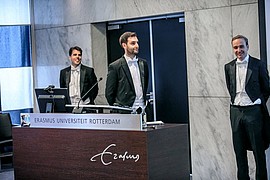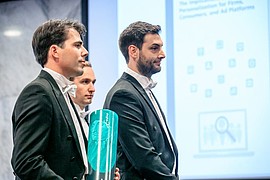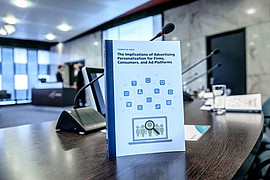PhD Defence: Thomas Frick

In his dissertation ‘The Implications of Advertising Personalization for Firms, Consumers, and Ad Platforms’, Thomas Frick investigates how firms can address consumers with more relevant ads, leading to more positive consumer responses.
Thomas Frick defended his dissertation in the Senate Hall at Erasmus University Rotterdam on Friday, September 21 at 11:30. His supervisors are Prof Ting Li and Prof Eric van Heck. Other members of the Doctoral Committee are Dr. Jason Roos (RSM), Prof. Paul Pavlou (Temple University), Prof. Rahul Telang (Carnegie Mellon University), Prof. Jan Damsgaard (Copenhagen Business School) and Prof. Benedict Dellaert (ESE).
About Thomas Frick

Thomas Frick was born in the year 1987 in Hechingen, Germany. He received a Bachelor of Science in Business Administration from Ludwig-Maximilians-Universität Munich and a Master of Science in Business Information Management from Rotterdam School of Management, Erasmus University.
In 2013, Thomas started his PhD research at Rotterdam School of Management, Erasmus University within the Business Information Management section of the department of Technology and Operations Management.
In his research, Thomas focuses on the implications of personalized digital advertising for firms, consumers, and ad platforms. In most of his research Thomas uses experiment methodology, with a focus on field experiments, to uncover causal relationships within the context of personalized digital advertising. Thomas is passionate about collaborating with firms and translating academic findings to business insights.
Since 1st of August 2018, Thomas is working as Assistant Professor in the Department of Digitalization at Copenhagen Business School.
Thesis Abstract

The personalization of advertising offers firms tremendous potential. If done right, firms can address consumers with more relevant ads, leading to more positive consumer responses. Nevertheless, firms are struggling with how to design personalization strategies and face the challenge to correctly assess advertising effectiveness. With this research, we advance the understanding of advertising personalization and its implications for firms, consumers, and ad platforms.
With the help of a large-scale field experiment, we present evidence for how firms should design their personalization strategies. We find that high levels of personalization specificity pay off for firms. At the same time, socially targeting personalized ads, where names of consumers' friends are included in the ad text, leads to less positive consumer responses.
To advance the understanding of privacy concerns in advertising personalization, we conduct a lab experiment using eye tracking technology. Our findings reveal that firms cannot use intrusive ads, that cause privacy concerns, to attract consumers' attention. Such a strategy is harmful as it decreases consumers' overall attention towards ads, eventually leading to less positive consumer responses.
An examination of contracts between firms and ad platforms exposes that these contracts might not be in the economic interest of firms. We conduct a large field experiment and our analysis reveals that currently implemented contracts between ad platforms and firms lead to an incentive misalignment that is harmful for firms. While ads generally increase consumers' likelihood to purchase, firms pay more for ads that are not providing higher value to them.
Photos: Chris Gorzeman / Capital Images


